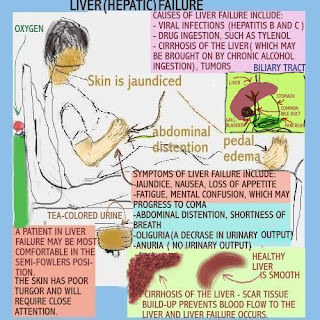LIVER (HEPATIC ) FAILURE AND PARACENTESIS - QUIZ QUESTIONS
6/25
Cirrhosis of the liver
Cirrhosis of the liver is caused by scar tissue build-up on
the liver, (often caused by chronic alcohol or drug ingestion).
This prevents blood flow to the liver and causes liver failure
to occur. A healthy liver is normally smooth.
Causes of liver failure
- Viral infections (such as Hepatitis B and C)
- Drug ingestion (such as Tylenol)
- Cirrhosis of the liver* (which may be brought
on by chronic alcohol/drug ingestion)
- Tumors
Signs and symptoms of liver failure
- Jaundice, nausea, loss of appetite
- Fatigue, mental confusion (which may progress to a coma)
- Abdominal distention, shortness of breath
- Pedal edema
- Tea-colored urine
- Oliguria (a decrease in urinary output)
- Anuria (no urinary output)
Anasarca ( generalised edema) may lead to skin breakdown.
The skin has poor turgor and will require close attention.
The skin has poor turgor and will require close attention.
Ammonia and other toxins, may travel to the brain, via the
blood. This may occur when the liver is no longer able to
perform its function. Lethargy and mental confusion may
occur.
blood. This may occur when the liver is no longer able to
perform its function. Lethargy and mental confusion may
occur.
A patient in liver failure may be most comfortable in the
Semi-Fowlers position. This could be reflected in the plan
of care.
Paracentesis
The liver becomes enlarged in liver failure.
The abdomen also becomes enlarged.
The abdomen also becomes enlarged.
Patients also have difficulty breathing.
Paracentesis is performed to remove excess
Paracentesis is performed to remove excess
fluid and make breathing easier.
Enjoy watching the video:
The New Nurse and organ failure
The New Nurse and organ failure
Quiz questions
1. What is cirrhosis of the liver?
2. What are some of the causes of hepatic failure?
3.What are some of the symptoms of liver failure ?
3.What are some of the symptoms of liver failure ?
4. What is anasarca ?
5. What is a Paracentesis?
5. What is a Paracentesis?
Learn more about : Care planning






Comments
Post a Comment